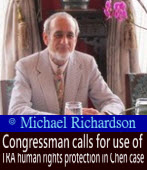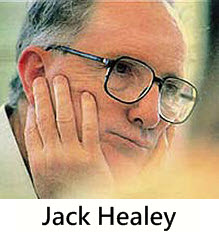|
陳水扁獄中受不人道對待 美國會議員呼籲調查
陳水扁今年3月間戒護就醫檢查時,署立桃園醫院檢查發現扁的攝護腺有1顆腫瘤,當時署立醫院醫療小組先用藥物控制,並建議門診檢查,經過台北監獄和署立桃園醫院開會,今天清晨約6時餘,陳水扁三度至署桃戒護就醫檢查。
署立桃園醫院醫療小組指出,阿扁這次回診主要是進行心電圖、胸部x光、抽血、肺功能及泌尿道的檢查,檢查約2個小時左右結束。最後,陳水扁坐著輪椅,在獄警戒護下,上午8時餘結束回診,坐上北監的警備車,返回北監。
陳致中及江志銘轉述,陳水扁攝護腺腫瘤原本1顆,現變成2顆,不但沒消失,又變大,要安排切片檢查,現服用藥物,要停藥10天,才能進行手術,一切要等停藥情況,再進一步安排。
陳致中說,這次回診追蹤檢查,醫院認為父親的心肺功能仍有問題,一時還沒辦法找出確切原因,另陳水扁喘得很厲害,醫師也認為異常。
陳致中及陳幸妤一早就到醫院,要陪同阿扁檢查,不過,北監以這次檢查不是侵入性治療,未讓他們2人全程陪同。陳致中說,來陪父親就是為確保過程順利,不可能干擾檢查,實在沒理由不讓他們陪同;陳幸妤則沒有正面回應。
扁辦今日也發表新聞稿特別指出國際對扁案之重視,新聞稿提到,今年3月29日俄亥俄州共和黨夏波眾議員(Steve Chabot, R-OH)在美國國會公開呼籲馬政府儘速終結這一場悲劇,繼之加州共和黨朗格倫眾議員(Dan Lungren, R-CA)於4月18日致函美國眾議院「湯姆‧蘭托斯人權委員會」共同主席—維吉尼亞州共和黨沃爾夫議員(Frank Wolf)與麻薩諸塞州民主黨麥高文議員(Jim McGovern)— 強烈呼籲調查台灣前總統陳水扁的監禁案。朗格倫於信函中籲請共同主席再次關注「過去幾週,關於台灣前總統陳水扁先生逐漸惡化的健康情形,令人擔憂的發 展」。並要求委員會須「強力敦促台灣政府允准陳前總統保外就醫,以獲得適當醫療照護。」
對此,扁辦也表達感謝之意,感謝國際社會基於人權保障、人道關懷提出疾呼,並籲請馬英九政府應當嚴肅看待陳前總統健康惡化之事實,台灣自詡為世界上文明國家,則應儘速終結對於陳前總統之殘酷及不人道對待。
2012-04-23
敬請分享以下以下兩個連結,並協助大量轉寄。
Congressman calls for use of TRA human rights protection in Chen case
Michael Richardson, Taiwan Policy Examiner

U. S. Representative Dan Lungren (R-CA) has called for Congressional investigation of the treatment of former Republic of China in-exile President Chen Shui-bian who has been serving a lengthy sentence for alleged corruption since soon after he left office nearly four years ago.
Representative Lungren asked the Lantos Commission, a 79-member caucus of members of Congress, to investigate “disturbing reports” about Chen’s imprisonment that have appeared in the Taiwanese news media.
Dan Lungren’s written request cited the human rights clause of the Taiwan Relations Act as the jurisdictional basis for a Congressional inquiry: “The preservation and enhancement of the human rights of all the people on Taiwan are hereby reaffirmed as objectives of the United States.”
Mark Kao, head of the Formosan Association for Public Affairs, hailed Lungren’s request in a formal statement: “The people and the government of Taiwan look to the United States as the standard bearer for democracy and human rights around the world, and it is encouraging to see that the recent alarming developments in president Chen’s situation have not gone unnoticed.”
Chen Shui-bian, convicted after a controversial trial, has been suffering from heart, respiratory, and prostate problems while in prison and been denied medical leave to receive treatment other than that offered by prison doctors. A recent emergency trip to a hospital for Chen’s heart condition led to the disclosure that the former ROC president had been secretly drugged for 14 months with lorazepan, a psychiatric medication, by prison doctors.
John Hsieh, of the Taiwan Civil Rights Litigation Organization, has called the drugging of Chen “evil” and suggested it was a prosecutable violation of the Torture Victims Protection Act.
The Formosan Association for Human Rights has called Chen’s treatment “inhuman” and has been critical of the cramped jail conditions of Chen, forced to remain long periods in a tiny cell with no bed, table, or chair.
Lungren’s appeal to the Lantos Commission noted that Chen’s “corruption charges are widely believed by international observers and legal scholars to be politically motivated.” The Tom Lantos Human Rights Commission’s formal mission is to “promote, defend and advocate internationally recognized human rights.”
Chen Shui-bian’s treatment in prison recently emerged in the U.S. House Foreign Affairs Committee in a hearing on China. Representative Steve Chabot (R-OH) used a question and answer session to criticize Ma Ying-jeou’s Kuomintang administration: “I think for an administration to come in and essentially jail the previous administration is a tragedy.”
Sadly, the United States has a long history ignoring human rights abuses by the Republic of China in-exile. Under the San Francisco Peace Treaty that ended World War II with Japan, the United States is the principle occupying power of Taiwan, as the island of Formosa is commonly known. However, American presidents have turned a blind eye to decades of harsh treatment of the island people by the Chinese Nationalist regime imposed by U.S. military forces in October 1945.
Cold War politics have kept Taiwan locked in a time warp of “strategic ambiguity” and under continuing occupation by the ROC government that retreated to the island in 1949 after losing the Chinese civil war to the People’s Republic of China.
In 2009, the District of Columbia U.S. Court of Appeals called on President Barack Obama to determine the sovereignty of the island calling Taiwan’s plight “political purgatory.”
Chen Shui-bian is now experiencing his own purgatory in a ROC jail cell while growing criticism of America’s proxy government over the former Japanese territory is heard in Washington, D.C.
Taiwan’s unresolved status has kept the densely populated island of 23 million people out of the United Nations and barred from membership in the World Health Organization.
2012-04-24
http://www.examiner.com/article/congressman-calls-for-use-of-tra-human-rights-protection-chen-case
Chen, Hundred Names and the Rough Waters of Human Rights
Jack Healey, the Founder of the Human Rights Action Center
In the world of human rights, there is always a tension between those in power and the common folk. There needn't be. In Chinese, the term Lao Mingzi means Old Hundred Names. It is an idiom that denotes the mass of society, encompassing the traditional surnames of Chinese culture. Typically, those in power have the prerogative of respecting or denying the rights of the common people. Still, there are times when power reverses and the former holders of power find themselves down among the common people in terms of tenuous agency with regards to human rights.
Such is the case with former President Chen of Taiwan. Imprisoned, he is currently tossed by the rough waters of a calculated denial of medical treatment and subsequent human rights abuses. No wonder President Assad of Syria is fighting like there is no tomorrow. He might have read the details of President Chen Shui Bian's treatment by Taiwan's current government, even though Chen was president from 2000 to 2008.
Chen is in jail for corruption charges, some of which might are real and some are not, according to international observers and legal observers. Chen is serving a 19-year sentence for corruption charges (all charges are for nonviolent offenses). He has served over 1240 days in a cell of sixty square feet (5x12) and with a continual stream of other prisoners as fellow cellmates. Water is on for only ten minutes each day. There is no sunlight. There is no shower. There is no bed, table, or even permitted speaking with other cellmates. He is permitted 30 minutes of exercise each day. The only regular "amenity" is a squat toilet.
After complaining of not feeling well for months, he finally got a medical review on March 6, 2012, because of pressure from 13 members of his opposition party. The result of the medical review found out why he was not feeling well. It was the result of having prostate cancer and an acute coronary syndrome causing reduced blood flows. He discovered from the review that he'd been put on a benzodiazepine (a class of drugs that includes Valium and involves a high risk of dependence, as well as a host of other negative side effects). Chen rejected these drugs and, after undergoing a cardiac catheterization procedure, he was returned to the same conditions in prison within a days.
Why I am writing about President Chen is that he is at risk of dying in prison due to the Taiwanese government engaging in willful medical neglect. He is about to die imprisoned by a government he ran for years because that government will not grant him the basic human right or reasonable care. I hope the Tom Lantos Human Rights commission, which has done some fine human rights work, might be persuaded to intervene with public statements and to use their strength to help this abused prisoner, even if he is guilty of the corruption charges.
California Representative Dan Lungren has asked this committee to help. What is hard to understand is why our government as a whole is not upset about another democratic government mistreating and maybe killing its former president. Is this not a human right violation by an an enormously important trade partner and a leading light of contemporary change in the Chinese-speaking world? Why is this not covered in the press? The illness of the Ukrainian president was brought to our American attention when it was in the interest of our strategic plans for that region. Why no coverage for an important trade partner's former leader who is affiliated with a party currently in opposition? We should stand for no less than basic human rights for all people. Nobody suggests that former political officials in the United States be denied medical treatments due to their political defeat or ending up in custody. I can only hope that we would stand up for the treatment of anyone else for the same principle of equitable treatment in custody.
These are the latest facts. And I'd like to be clear in asking you to call your congressional representatives as soon as you read this. Chen has failed lung function tests three times since his March 6 health exam. A lesion was spotted in one lung. He coughs continually. He is short of breath with a constant feeling of chest pressure. These details were leaked, not publicly released. The family, contrary to Taiwanese law, has not been given his medical records. On April 23, 2012, Chen was diagnosed with a second tumor in his prostate. On this trip to the hospital, he was allowed only a two-hour visit with his family. Taiwan's laws require better treatment. Chen is not getting this treatment. Though all his assets are frozen, he nevertheless has to arrange for payment for his medical procedures.
All I am asking for is good medical treatment of this prisoner. That is it. Taiwan may not like this former president; they may even hate him. It does not matter. Taiwan's people and hearts don't need to be with this man simply because he ran the nation. People should know, and believe, that any prisoner will be treated like a human being with all the attendant human rights that entails, including access to medical care. Using a prison system to kill an opponent is savage and ruthless. The present government of Taiwan must not maim and kill using the slow and painful death by neglect.
What I am asking you for a letter to the Tom Lantos Committee for Human Rights, to the White House and to your congressional representatives. If human rights are to mean anything, if leaders of any government of any kind are to be encouraged to respect the basic rights of reasonable care, it is imperative to not have people subjected to imprisonment and the withholding of care as a tactic of political revenge or grudge-settling.
Taiwan has come a long way to tolerate and respect human rights from its uglier past of dictatorship. It has, until recently, shown itself to be a beacon of freedom and human rights in the generally retrograde political world of Chinese politics with regard to human rights. This does not give it, nor should it give anyone, the ability to simply opt-out in the treatment of a prisoner's basic human rights for reasonable medical care.
An email is good. A phone call is better. A follow-up with a physical letter is best. Please do what you can to safeguard the rights of prisoners of all walks of life. Nobody should die in prison for lack of access to a medical care system that can help them live. Human rights should be rights for all humans and not some humans.
You can find and contact your political representatives in the United States by looking here: www.contactingthecongress.org. You should NOT wait to do this. A human life hangs in the balance. The treatment of those who have been politically defeated must adhere to minimal standards to make it clear to despots around the world that loss of power will not lead to death by neglect. The treatment of humans should adhere to the standards of universal human rights.
Please. Take a moment to make the call and write the letters and emails. A life hangs in the balance.
2012-04-24
The Huffington Post / Jack Healey
http://search.huffingtonpost.com/search?q=jack+healey&s_it=header_form_v1

source: 台灣e新聞
阿扁醫療照顧 引國際人權團體關注
新頭殼newtalk 2012.04.25 林金玉/編譯報導
因貪瀆案入獄服刑的前總統陳水扁,週一(23日)清晨3度戒護就醫,讓阿扁在獄中是否受到合理醫療照顧的問題再度受國際人權團體注目。
曾擔任國際特赦組織董事13年的人權工作者傑克•希利(Jack Healey),星期二(24日)特地在美國《赫芬頓郵報》的部落格上撰文評論,指出由於台灣政府蓄意忽略阿扁的基本人權或提供合理的醫療照顧,讓阿扁面臨病死獄中的風險。
希利在文中開宗明義指出,在人權世界中,當權者和老百姓之間始終存在緊張。一般而言,當權者掌握著尊重還是剝奪老百姓人權的特權。儘管如此,當權力轉向時,原先位高權重的人將發現自己也落入平凡百姓的處境,沒有能力捍衛自己的人權,而前總統阿扁的狀況正是如此。
希利認為,台灣政府刻意拒絕提供阿扁醫療照顧,已引發繼之而來的人權虐待問題。
阿扁因被控貪瀆坐監服刑,不過根據國際與法律觀察員的看法,其中部分指控很可能是真實的,有些則不是。但希利撰文的目的在強調台灣政府蓄意忽略的結果,阿 扁可能落得死在獄中的下場。希利呼籲美眾議院的藍托斯人權委員會(Lantos Human Rights commission)予以干預,發表公開聲明並運用他們的力量協助這名被虐待的囚犯,即使他犯下貪瀆罪名。
希利說,他很難理解何以美國政府對另一個民主國家虐待並且可能殺害前總統的行徑不會感到生氣?他指出,台灣是美國非常重要的貿易夥伴,也是華語世界展開當代轉型的領先標竿,美國應該替全體人類的基本人權挺身站出。
他說,沒有人會同意拒絕提供美國前朝官員醫療照顧,只因為他們在政治上的失敗或淪為階下囚。希利希望美國能站在任何被羈押囚犯理當被公平對待的原則上,同樣處理阿扁個案。
希利呼籲提供阿扁良好的醫療照顧。他說,台灣可能不喜歡這位前總統,甚至恨他。但台灣人應該知道並且相信,任何囚犯都應獲得作為人類應有的對待,享有人權,包括取得接受醫療的管道。
他寫道,利用監獄系統殺死一個對手是野蠻而殘酷的。倘若人權有其重要性,應鼓勵任何形式政府的領導人尊重合理醫療的基本人權,特別是,勿以監禁異己和延遲提供醫療的手段遂行政治報復或解決恩怨的目的。
美國共和黨眾議員龍格倫(Dan Lungren)上週致函藍托斯人權委員會共同主席與其他國會議員,呼籲調查台灣前總統陳水扁的監禁案,並要求委員會須強力敦促台灣政府准許陳前總統保外就醫,以獲得適當的醫療照護。
希利自己創立的「人權行動中心」(Human Rights Action Center)組織,自1999年起即參與協助當時仍遭軟禁的緬甸民運領袖翁山蘇姬,記錄並對外發表翁山蘇姬的言論。
source: 新頭殼
|


 字體:小 中 大
字體:小 中 大



 字體:小 中 大
字體:小 中 大







